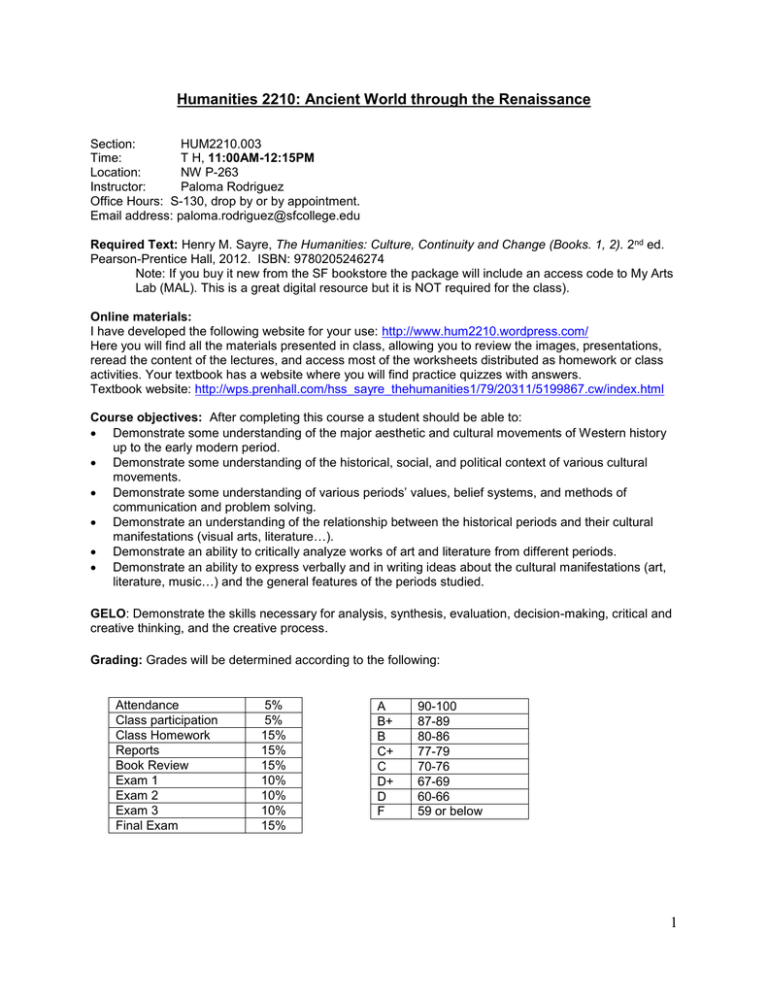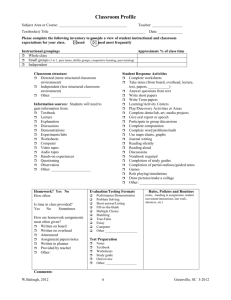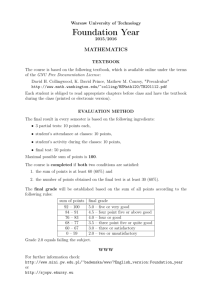
Humanities 2210: Ancient World through the Renaissance
Section:
HUM2210.003
Time:
T H, 11:00AM-12:15PM
Location:
NW P-263
Instructor:
Paloma Rodriguez
Office Hours: S-130, drop by or by appointment.
Email address: paloma.rodriguez@sfcollege.edu
Required Text: Henry M. Sayre, The Humanities: Culture, Continuity and Change (Books. 1, 2). 2nd ed.
Pearson-Prentice Hall, 2012. ISBN: 9780205246274
Note: If you buy it new from the SF bookstore the package will include an access code to My Arts
Lab (MAL). This is a great digital resource but it is NOT required for the class).
Online materials:
I have developed the following website for your use: http://www.hum2210.wordpress.com/
Here you will find all the materials presented in class, allowing you to review the images, presentations,
reread the content of the lectures, and access most of the worksheets distributed as homework or class
activities. Your textbook has a website where you will find practice quizzes with answers.
Textbook website: http://wps.prenhall.com/hss_sayre_thehumanities1/79/20311/5199867.cw/index.html
Course objectives: After completing this course a student should be able to:
Demonstrate some understanding of the major aesthetic and cultural movements of Western history
up to the early modern period.
Demonstrate some understanding of the historical, social, and political context of various cultural
movements.
Demonstrate some understanding of various periods’ values, belief systems, and methods of
communication and problem solving.
Demonstrate an understanding of the relationship between the historical periods and their cultural
manifestations (visual arts, literature…).
Demonstrate an ability to critically analyze works of art and literature from different periods.
Demonstrate an ability to express verbally and in writing ideas about the cultural manifestations (art,
literature, music…) and the general features of the periods studied.
GELO: Demonstrate the skills necessary for analysis, synthesis, evaluation, decision-making, critical and
creative thinking, and the creative process.
Grading: Grades will be determined according to the following:
Attendance
Class participation
Class Homework
Reports
Book Review
Exam 1
Exam 2
Exam 3
Final Exam
5%
5%
15%
15%
15%
10%
10%
10%
15%
A
B+
B
C+
C
D+
D
F
90-100
87-89
80-86
77-79
70-76
67-69
60-66
59 or below
1
N.B.: Students become eligible for a grade of I (Incomplete) only in cases of serious emergency and only
after successful completion of 75 % of the course.
Attendance Policy:
Attendance and class participation equals 10% of your final grade in this course (one full letter
grade).
A student with 3 absences will lose all attendance credit for this course.
A student with 5 absences will automatically fail the course.
There is no distinction between excused and unexcused absences. If you're not here, you're not
here. Simply plan your absences wisely.
Lateness and/or leaving class early will be counted as absences.
Points will be deducted from your class participation grade if you do not attend class.
I expect that all students will be prepared for and attend every class. These are some of the reasons why
you should attend every class:
-Classroom attendance will facilitate your learning enormously by helping you summarize and
process the information from the textbook. Actually you will be saving in study time by coming to
class!
-Lessons will supplement and enrich the course content through films, presentations, and
discussions. This information cannot always be found in your textbook or online. If you miss class you
will be missing an important part of the coursework, and your performance in exams is likely to suffer
because of it.
Class participation:
While in class you are expected to interact with peers and participate in discussions. This class will
demand your involvement. It will not consist of lectures alone. You will be asked to participate in class
activities which will be performed sometimes individually and sometimes in groups.
Warning: You will lose part or all class participation points:
- If you are reluctant to participate in class discussions and/ or to work in groups or with a partner.
- If you are not prepared for class (if you have not completed your homework, you have not read
the assigned texts, etc.)
- If you are disruptive, for instance by interrupting the lectures by talking to someone else.
-If you are distracted from class in any way.
-If you use your phone at all during class (to talk, text, or browse the internet)
-If you use a laptop for purposes other than taking notes.
Students engaging in disrupting behavior will be dismissed from class for the day and will be counted
absent.
Look at these policies from the bright side. By coming to class every day, bringing your
homework, and participating in class activities you will be given 20 points towards your final
grade! On top of that you will be actually reducing the amount of study you would have to do
on your own, if you didn’t attend class.
Homework
a) Daily Class Assignments: There are different types of class homework assignments:
1. Textbook worksheets to be completed by reading each chapter of your textbook. The worksheets will
help you assimilate the most important information in each chapter.
2
2. Extra readings: Handouts with texts and related questions that are not in your textbook. They will
complement the content of the course.
3. Writing practice: Handouts with exercises that will require that you write a short essay. This will give
you the chance to practice your academic writing, a fundamental skill in this course.
4. Documentary/ Movie reports: I will ask you to watch specific movies and/or as homework. You will have
to write short reports or answer questions about them. The completion of these worksheets will count
towards the class homework portion of your grade.
I check homework daily. I expect you to show a reasonable recollection and understanding of the
concepts discussed in the assigned handouts and readings when you come to class. If you fail to show
such understanding and/or you do not bring your completed homework to class, points will be
deducted from your homework AND class participation grades. Should there be any pop-quizzes,
your grades in them will be part of your homework grade.
b) Papers/ Projects: In addition to the three examinations and the final exam, you will also have to
complete three reports and an essay paper.
1. Book Review: This assignment will require that you read a work of literature related to class
material. You will have to choose one work from a list of historical novels and primary sources
and write a 600 word long report about it showing your ability to connect the information learned
in class with your reading. I will monitor the progress of your reading throughout the course by
including questions about it in exams and quizzes.
2. Reports: For this assignment you will have to attend one lecture, one performance, and one
guided tour of a museum related to class material. You will have to write a 500 word long report
about each experience. Reports need to be informative, concise, well structured, and properly
written.
Specific guidelines for each of these assignments will be provided during the course.
N.B.: This is a writing intensive course. Satisfactory completion of these writing assignments is a
prerequisite to successful completion of this course.
Make-up Policy and Late Work: Make-ups and extension will only be given in extreme circumstances
(hospitalizations, death in the family…). Documentation will be required. If you turn in your project, papers
or homework late you will only receive partial credit for it. One letter grade will be deducted from the
grade you earn for every day the assignment is overdue.
Academic Honesty Policy: Academic dishonesty is not accepted in any class at Santa Fe Community
College, and I will vigorously pursue and prosecute any instances of such dishonesty. One extremely
serious offense you must avoid is plagiarism, or using the research, ideas or words of others as your own
without giving proper credit to your source. I will not tolerate plagiarism or cheating of any sort. Students
who cheat or plagiarize written material in any way will receive an automatic zero on the assignment and
will fail the course. This policy especially includes copying or paraphrasing written materials from gallery
brochures, play programs, books, periodicals, encyclopedias, CD-ROMs, the Internet, or someone else’s
paper. By the act of submitting written work or an examination, the student signifies that he or she
understands the definition of academic dishonesty and is willing to accept the consequences for any
violation.
Academic Integrity: The very nature of higher education requires that students adhere to accepted
standards of academic integrity. Therefore SFC has adopted a Code of Student Conduct that outlines
3
general guidelines. Students are encouraged to discuss issues related to academic integrity with
instructors. For more information go to this Web page (new URL):
http://dept.sfcollege.edu/rules/content/media/PDF/Rule_7/7_23.pdf
Americans with Disabilities Act (ADA): If you are a student with a disability: In compliance with Santa
Fe College policy and equal access laws, I am available to discuss appropriate academic
accommodations that you may require as a student with a disability. Request for academic
accommodations need to be made during the first week of the semester (except for unusual
circumstances) so arrangements can be made. You must be registered with Disabilities Resource Center
(DRC) in S-229 for disability verification and determination of reasonable academic accommodations.
Discrimination/Harassment Policy: SFC prohibits any form of discrimination or sexual harassment
among students, faculty and staff. For further information, refer to the SFC Human Resources Policies
Web page (new URL) at
http://dept.sfcollege.edu/rules/content/media/PDF/Rule_2/2_8.pdf
Examinations: There will be three unit exams, composed of both short questions (true-false, multiple
choice …), and essay questions. Make-up exams will NOT be given unless truly extraordinary
circumstances arise. Adequate documentation will be required. No final exam will be given early.
Final Exam Date: 05/01/2014 Time: 10:30 AM to 12:30 PM Campus: NW Bldg/Room: P-263
Tentative Schedule:
Chapter 1: The Rise of Culture (Prehistory)
Chapter 2: Mesopotamia
Chapter 3: Egypt
Chapter 4: Aegean World (and Rise of Greece)
Exam 1
Chapter 4: (Aegean World) and Rise of Greece
Chapter 5: Golden Age of Athens
Chapter 6: Rome
Exam 2
Chapter 8: The Flowering of Christianity
Chapter 9: The Rise and Spread of Islam
Exam 3:
Chapter 10: Fiefdom and Monastery
Chapter 12: The Gothic Style
Chapter 13: Siena and Florence in the Fourteen Century
Final Exam: May 1st 2014
4
Important dates
January
9
21
February
5
26
March
18
April
8
15
May
1
Museum Night at the Harn Museum:
Horsing around with the Year of the Horse, Thursday, 6-9 pm.
Book in hand
Museum Night at the Harn Museum: Kongo at the Heart, Thursday, 6-9 p.m.
Report 1
Report 2
Report 3
Book Review due
Final Exam
Other Important Dates
January 20th 2014
MLK- no class
March 3-7, 2014
Spring Break- no class
May 1st, 2014
Final Exam
5



